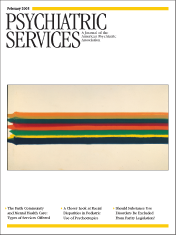Intensive Dialectical Behavior Therapy for Outpatients With BorderlinePersonality Disorder Who Are in Crisis
Abstract
OBJECTIVE: This study examined the effectiveness of an intensive version of dialectical behavior therapy for patients in an outpatient setting who met criteria for borderline personality disorder and who were in crisis. METHODS: Over the two-year study period, 127 patients (103 women) between the ages of 18 and 52 years were referred to the program; 87 were admitted, and because of a limited number of places, 40 were referred elsewhere. Patients were admitted after recent suicidal or parasuicidal behavior, and the most suicidal patients were given priority. The treatment was a three-week intensive version of dialectical behavior therapy consisting of individual therapy sessions; an emphasis on skills training provided in groups, including mindfulness skills; and team consultation. A diagnostic interview was administered, and patients were screened with the International Personality Disorder Examination Screening Questionnaire, the Beck Depression Inventory (BDI), the Beck Hopelessness Scale (BHS), and the Social Adaptation Self-Evaluation Scale. RESULTS: The only significant difference at intake between patients admitted to the program and those referred elsewhere was a slighter higher incidence of antisocial traits in the latter group. Of the 87 patients admitted, 71 (82 percent) completed the program and 16 (18 percent) dropped out. Pre-post analysis showed significant improvement in scores on the BDI and BHS. CONCLUSIONS: The three-week, intensive version of dialectical behavior therapy was found to be an effective treatment. Treatment completion was high, and patients showed statistically significant improvements in depression and hopelessness measures. This approach allowed therapists to treat a large number of patients in a short time.



